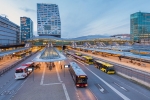
Climate change and resource scarity
Growth in global population and prosperity also increases the demand for natural resources such as water, energy, minerals / metals and food.
There are, however, limited quantities of resources available. Furthermore, emissions of green-house gases from this large-scale consumption of resources constitutes a threat to our immediate environment. If nothing changes, we will exceed the emission levels in 2034 required to limit a temperature increase to 2 degrees. Our planet no longer seems capable of supporting this increased consumption. The economic impact will be amplified by the interdependence between climate change and resource scarcity, with a large impact on food and water issues.
Price uncertainty and increasing regulation pressure
Due to strong growth in the demand for natural resources, there is increased dynamic between supply and demand. This results in price volatility. Acquisition of resources is made more difficult due to the exhaustion of easily-accessible reserves or concentration in a limited number of countries. Rising prices could result. Companies will have to learn to cope with this increased insecurity in resource prices and develop active strategies (from hedging to vertical integration) to secure supplies of resources.
The increasing consumption of resources also places a very high amount of pressure on our immediate environment. Green-house gas emissions, pollution of water systems and the problem of waste disposal are endangering our planet and constitute an environmental threat for future generations. Governments are responding by developing new regulations. The resulting regulatory load on companies is expected to increase. For instance, European climate objectives are setting a course for the transition to a low-carbon European economy in 2050.
Short and long-term answers needed
Dutch companies are also confronted with climate change and resource scarcity. This gives rise to various questions about the long-term strategy of these companies. Are their business models sustainable over the long term? From where will new growth come? What roles will these companies play in the changing world? They have important choices to make, even over the short term: How can they cover price risks? How will they make their supply chains less vulnerable? How can they reduce their dependence on raw materials? Which collaborations or transactions are necessary to secure resources?
New solutions
In addition to the measures that companies must take to reduce risks, there are new opportunities for green growth, driven by technological developments. Many green technologies are at the point of becoming competitive alternatives to fossil fuels, both in terms of energy production (renewable energy) and the chemical industry (bio-based economy). Digitalisation is instigating the transition to what is being called the “sharing economy”, in which the demand for product possession decreases and consumption increasingly involves the sharing of products (such as cars, tools, etc.). Moreover, improved recycling is creating new possibilities for the recovery and re-use of resources (circular economy).

International
Related content


Shift in economic power
The shift in economic power will have a large impact on growth potential for companies and the countries in which future investments will be made.

Rapid urbanisation
Cities are becoming increasingly more important in the global economy. In addition, metropolitan regions in which cities seek cooperation to achieve higher...

Technological change
New technologies give rise to a gap. Many of these technologies have already generated a great deal of discussion. Examples include the implementation of...
Contact us


Global Leader, P&U and EU&R, Partner, PwC Netherlands
Tel: +31 (0)65 160 91 78

















